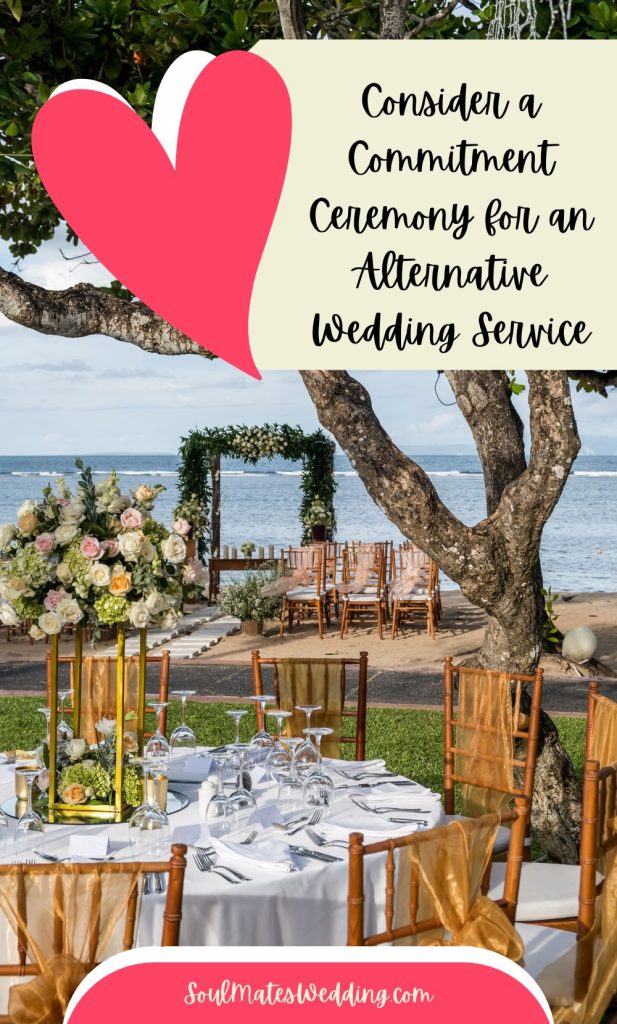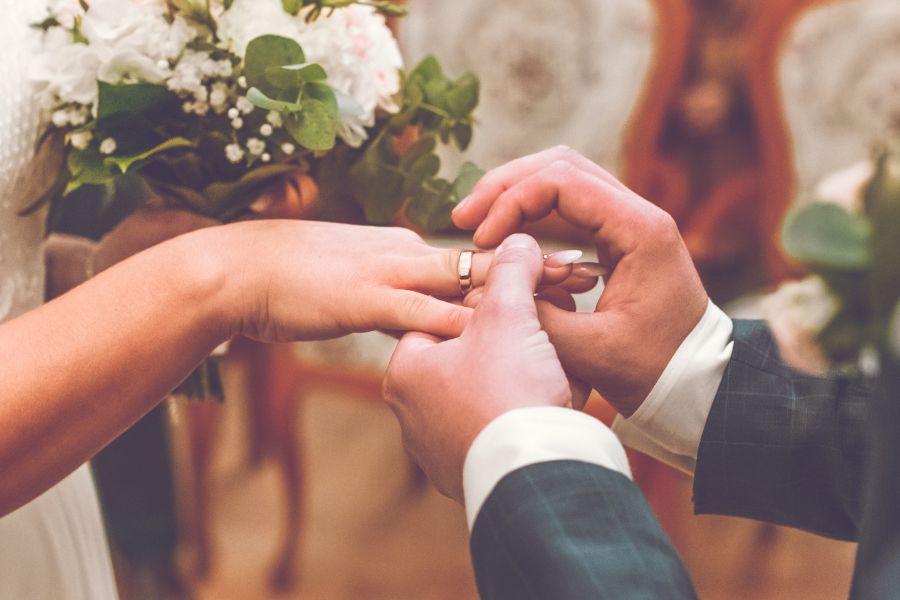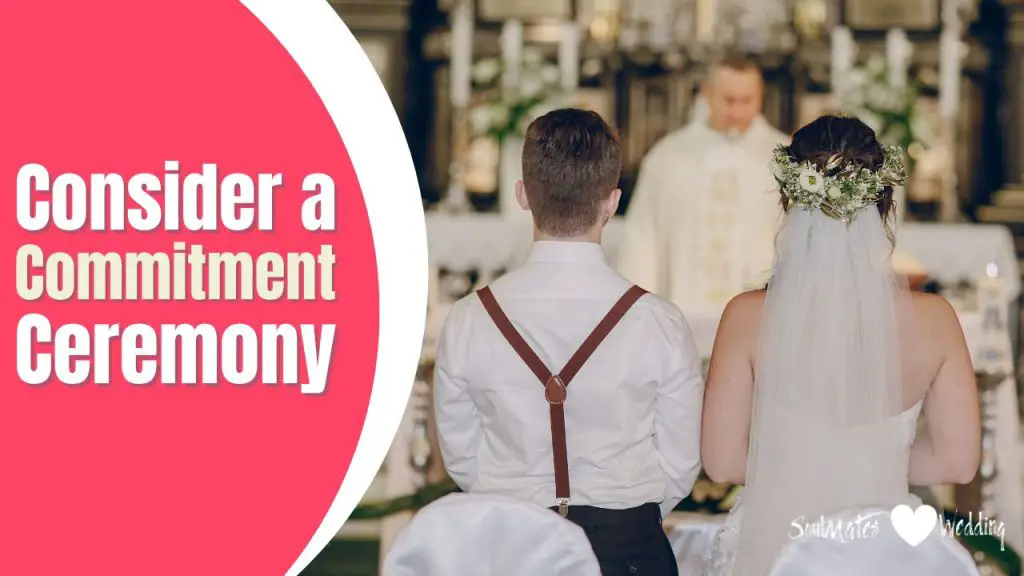Are you looking for a unique and meaningful way to celebrate your union with your partner, but don’t want a traditional wedding? Have you considered a commitment ceremony?
A commitment ceremony is a non-legally binding ceremony that celebrates the love and commitment between two partners. It’s a great option for couples who want to express their love and devotion to each other without the legalities and religious aspects of a traditional wedding.
In this article, we’ll explore what a commitment ceremony is, its benefits, and how to plan one that reflects your love story and values.

Types of Commitment Ceremonies
Commitment ceremonies are a popular trend among couples who want to celebrate their love and commitment to each other in a meaningful way. While these ceremonies are not legally recognized, couples can still exchange vows and publicly affirm their commitment to one another in a variety of types of ceremonies.
There are different types of commitment ceremonies that couples can choose from for their special day. Some couples may opt for a traditional ceremony, while others may choose to incorporate cultural or spiritual traditions that hold meaning for them. For instance, some may choose to have a handfasting ceremony, which originated in ancient Celtic tradition. This type of ceremony involves the binding of the couple’s hands together with ribbons or cords, symbolizing their commitment and connection to each other.
Similarly, some couples may choose to have a commitment ceremony that focuses on adventure elopements or unique experiences. These types of ceremonies can range from intimate ceremonies on a mountaintop or beach to more elaborate affairs, such as a private chef dinner in a stunning location.
In terms of venues, the possibilities are endless. Couples can choose from a variety of stunning locations such as beaches, gardens, mountaintops, or even their own backyard. The perfect venue for a commitment ceremony depends on personal choice, with some couples opting for a secluded and intimate location, while others prefer a grand and elaborate venue.
Regardless of the type of commitment ceremony a couple chooses, the focus is on celebrating their love and commitment to each other. While these ceremonies may not have legal benefits, they still hold significant emotional value to the couple and their loved ones.

Legal Aspects of a Commitment Ceremony
Commitment ceremonies are a popular trend among couples who wish to exchange vows and publicly affirm their commitment to each other. While commitment ceremonies do not carry the same legal weight as a wedding ceremony, there are legal rights and benefits that couples can access through legal processes. In this article, we will explore the legal aspects of a commitment ceremony, including the legal steps and paperwork involved, the types of unions recognized by law, and the legal rights and benefits available to committed couples.
Legal Paperwork
When it comes to commitment ceremonies, it’s essential to understand that they are not legally binding, unless specific legal paperwork is completed. This might come as a surprise to some, but to have a legally recognized union, couples need to complete the necessary legal steps, as required by their state or local laws.
The exact legal steps required will vary based on where you live, so it’s critical to do your research and find out what kind of legal paperwork you need to complete to make your commitment ceremony legally recognized. Typically, a legal marriage requires a legal license.
For a commitment ceremony to have legal recognition, the necessary paperwork may include signing a domestic partnership agreement, registering as domestic partners, or filling out a declaration of informal marriage, among other forms that might be required in different jurisdictions.
It’s important to note that the paperwork required may be different for straight couples or those of different sexual orientations. In some cases, tax benefits may be a consideration when deciding whether to complete the paperwork, but the process needs to be approached with careful consideration and awareness of its legal implications. Each jurisdictions will have different legal requirements to make sure the entire process is legally binding for the couple.

Traditional Wedding vs. Commitment Ceremony
The decision to formalize a union between two people can take many different forms. Some couples opt for a traditional wedding ceremony, complete with legal paperwork and a reception filled with friends and family. Others choose to have a commitment ceremony, which may or may not involve legal steps and is often more focused on a public affirmation of their relationship. In this article, we’ll explore the differences between a traditional wedding and a commitment ceremony, as well as the pros and cons of each type of union.
Differences between the Two Ceremonies
A commitment ceremony, also known as a non-legally binding ceremony, is a celebration of love and commitment between two people. It is important to note that there are major differences between a traditional wedding and a commitment ceremony.
One of the biggest differences between these two ceremonies is the legal process involved. In a traditional wedding, couples are required to obtain a marriage license which is a legally binding document that must be signed by both parties and returned to the government office. This license validates the marriage and carries legal implications. Conversely, a commitment ceremony does not have this legal aspect, meaning that the couple does not become legally married.
Another key difference is the guest list. In most cultures, traditional weddings are often large events attended by family members, friends, and sometimes even work colleagues. However, commitment ceremonies tend to be more intimate, with only close family members and friends in attendance.
The type of celebration is also different. Traditional weddings usually involve a lavish reception, with dinner, music, and dancing. On the other hand, commitment ceremonies are more relaxed and informal, with the focus being on the exchanging of vows and public affirmation of the couple’s commitment to one another.
It is also important to note that some couples may choose to have a commitment ceremony as part of their traditional wedding or elopement, without the legal aspect. For example, they may opt for a private ceremony with only a few close friends and family members, followed by a larger reception.
Elements from a Traditional Wedding that Can be Included in a Commitment Ceremony
While a commitment ceremony is not legally binding, it can still be a beautiful and heartfelt celebration of a couple’s love and commitment to each other. And while it may not have the same legal implications as a traditional wedding ceremony, there are still many elements from a traditional wedding that can be included in a commitment ceremony.
For example, couples can still choose to walk down the aisle, with one partner waiting at the end for the other. They can also choose to have a wedding party, with family members or close friends standing alongside them during the ceremony.
One of the most important elements of any wedding ceremony is the exchange of rings and vows, and these can certainly be included in a commitment ceremony as well. The rings signify the love and commitment between two partners, while the vows are a public affirmation of their dedication to each other.
In addition to the exchange of rings and vows, many traditional wedding ceremonies also include a unity ceremony. This can take many different forms, such as lighting a candle or pouring sand into a vase. The point is to symbolize the coming together of two individuals, and the creation of a new, unified partnership.
Other elements that can be incorporated into a commitment ceremony include readings, music, and even decorations. Flowers and candles can be used to create a romantic and intimate atmosphere, while favorite songs or poetry can be read aloud to add a personal touch.
Finally, while a commitment ceremony may not have the legal requirements of a traditional wedding, it can still be a wonderful opportunity to capture memories and special moments. Couples can hire a photographer or videographer to document the ceremony and create cherished mementos that they can treasure for years to come.
In short, while a commitment ceremony is not the same as a traditional wedding, it can still incorporate many of the same elements that make wedding ceremonies so special and meaningful. From walking down the aisle to exchanging rings and vows, couples have the freedom to design a commitment ceremony that truly reflects their love and commitment to one another.
Types of Celebrations for A Commitment Ceremony
Commitment ceremonies are a beautiful way for couples to publicly declare their love and dedication to each other. These ceremonies, while not legally binding, are still a meaningful way to honor the commitment between two individuals. There are many different types of celebrations that couples can choose from to make their commitment ceremony unique to their relationship and personal style. Let’s explore some of the most popular types of celebrations for a commitment ceremony.
Elopement Weddings
Elopement Weddings are becoming an increasingly popular part of the commitment ceremony trend. These intimate and romantic ceremonies are perfect for couples who want to celebrate their love in a more personal and stress-free way.
Elopement Weddings are a great choice for couples who are seeking a private, smaller ceremony with just the two of them or a few special guests. This type of commitment ceremony allows couples to get away from the traditional wedding planning process and instead focus on creating a ceremony that is unique to them and their love for each other.
There are many reasons why couples choose Elopement Weddings. For some, it’s the desire to have a more personal and intimate experience with their partner. For others, it’s the idea of having a stress-free day without the hassle and expense of a traditional wedding. Elopement Weddings also offer the freedom to choose any location, whether it be a beautiful outdoor setting or an upscale indoor space.
Elopement ceremonies can be a simple or elaborate affair, depending on the couple’s preferences. Some couples choose a simple and intimate ceremony under the stars, while others may opt for a luxurious destination ceremony with accommodations and additional amenities. Whatever the couple chooses, the focus of an Elopement Wedding is on celebrating the love and commitment they share, in a way that is meaningful and personal to them.
Overall, Elopement Weddings offer a unique and memorable way to celebrate the start of a new life chapter. They allow couples to celebrate their love in a personal and intimate way, without the added pressure and stress of traditional wedding planning. Couples are free to choose their perfect location, exchange vows in their own unique way, and honor their commitment to each other in a way that fits their style and personality.
Planning Your Own Commitment Ceremony
Planning a Commitment Ceremony allows couples to celebrate their love and commitment to each other without the legal and religious constraints of a traditional wedding. It’s an opportunity to create a unique and personalized ceremony that reflects the couple’s values and relationship. In this article, we’ll explore the step-by-step process of planning a commitment ceremony, including legal considerations, ceremony types, venue selection, guest list, and more. Whether you’re looking for a small and intimate gathering or a grand celebration, we have you covered.
Selecting a Venue or Space for the Ceremony
When planning a commitment ceremony, selecting the perfect venue or location is one of the crucial steps. You want to choose a place that speaks to you and your partner, and that will make your commitment ceremony special and memorable. There are various location options to choose from, including indoor and outdoor spaces, beaches, mountains, or even a backyard.
When considering the landscape, you’ll want to choose one that corresponds to your personality and style. For instance, mountainous landscapes are perfect for couples who appreciate nature and enjoy hiking. Wildflower meadows provide a romantic and dreamy atmosphere that is perfect for couples who love the outdoors. Desert and beach locations, on the other hand, provide a breezy, laid-back vibe that is ideal for couples who don’t want anything too formal.
The group size also plays a crucial role when choosing a venue. You will want to select a place that can accommodate your guests comfortably. If you are planning a small, intimate ceremony, a backyard or an indoor space will suffice. However, if you have a bigger group, you may want to consider a spacious outdoor location.
If you’re unsure where to begin, there are several top-notch locations with perfect landscapes that are ideal for commitment ceremonies. Colorado is an excellent choice, offering beautiful mountainscapes and stunning vistas. Hawaii is another popular option, with its picturesque beaches and tropical beauty. Utah is a perfect venue for couples who love the rugged outdoors, with its unique and stunning rock formations.
Ultimately, the location you choose must speak to you and your partner’s heart. It can be any place where you can exchange your vows and commit to each other in front of your loved ones. So whether it’s a park, a garden, a beach or even your living room, follow your heart and choose a venue that reflects your love for each other and makes your commitment ceremony a day to remember.
Making It Legally Binding
While commitment ceremonies are a beautiful and meaningful way for couples to publicly declare their love and commitment to each other, it’s important to note that they are not legally binding. However, some couples may want to make their commitment ceremony official for tax, benefit, or personal reasons.
To make a commitment ceremony legally binding, the couple must go through several legal processes required to register their union. First, they will need to obtain a marriage license or certificate from their local government office. This usually requires providing identification documents, such as a passport or driver’s license, and paying a fee. The couple will also need to meet certain requirements, such as being of legal age and not being closely related.
Once the couple has their marriage license or certificate, they will need to complete the necessary legal paperwork, such as signing a marriage contract. This may need to be done with the presence of witnesses, and the completed paperwork may need to be filed with the appropriate government office.
While the legal processes may seem daunting, there are ways to incorporate them into the commitment ceremony. The couple can add certain vows that reflect their desire to be legally recognized as a union or can choose special words to be said during the ceremony that reference the legal aspects of marriage.
Overall, making a commitment ceremony legally binding involves completing the necessary legal paperwork and obtaining a marriage license or certificate. With a bit of planning and preparation, a commitment ceremony can be both personally meaningful and legally recognized.

Cynthia Pate is a passionate writer and wedding enthusiast, dedicated to helping couples create their dream celebrations. With years of experience in the wedding industry, Cynthia has developed a deep understanding of the latest trends, timeless traditions, and unique ideas that make every wedding special. Her articles cover a wide range of topics, from planning and decor to etiquette and fashion, always with the goal of providing practical advice and inspiring ideas. When she’s not writing about all things wedding-related, Cynthia enjoys exploring new destinations, trying out local cuisines, and spending time with her family and friends.






